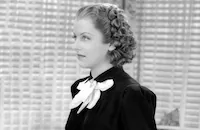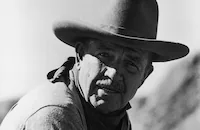Scarlet River

Brief Synopsis
Cast & Crew
Otto Brower
Tom Keene
Dorothy Wilson
Creighton Chaney
Betty Furness
Rosco Ates
Photos & Videos
Film Details
Technical Specs

Synopsis
Frustrated by the lack of good outdoor locations in the Los Angeles area, western film star Tom Baxter decides to move his movie crew out of Hollywood after he sees a photograph of the Scarlet River Ranch, which was sent to the studio by a would-be screenwriter named Ulysses Mope. Unknown to Tom, Jeff Todd, the ranch's foreman, has been plotting with banker "Clink" McPherson to ruin the ranch financially by burning hay and killing and rustling cattle. McPherson, who controls the loan on the ranch, wants to force owner Judy Blake into selling him the property so that he can then make a profit re-selling it to developers. After Tom and his crew arrive at Scarlet River and meet Judy and her young brother Bud, Tom develops immediate suspicions about Jeff, who is a boastful and uncooperative host. While ranch hand Ulysses is recruited to play a comic bit in the movie, Tom, who is attracted to Judy, offers to help her enroll Bud in a good private school. Soon after, Tom follows Jeff on his horse and catches him shooting a steer. Confronted, Jeff tells Tom that he had to kill the steer because it had drunk contaminated water. Sure that Jeff is lying, Tom announces that he is sending for a veterinarian to confirm Jeff's story, which prompts Jeff to plot with McPherson and his men to kidnap Judy and force Tom to leave. Tom, meanwhile, provokes Judy's ire when she catches him spanking Bud for smoking and talking back to him. To protect himself, Bud lies about the incident to Judy, but later apologizes to Tom and promises to make amends. McPherson then kidnaps Judy and sends Dummy, a mute, to deliver a note to Tom that stipulates that Judy will be released unharmed only when Tom and his crew leave Scarlet River. Disguised as Dummy, Tom infiltrates the gang's cabin and almost escapes with Judy but is captured. While McPherson plots Tom's "accidental" death, Tom and Judy plan another escape attempt, which is aided by the arrival of Bud and the movie crew. With the help of blanks, movie grenades and Tom's expert riding and fighting skills, Tom and the crew defeat McPherson and his gang and save Judy's ranch.

Director
Otto Brower
Cast
Tom Keene

Dorothy Wilson

Creighton Chaney

Betty Furness

Rosco Ates

Edgar Kennedy
Billy Butts
Hooper Atchley
Jack Raymond

Yakima Canutt

Joel Mccrea

Myrna Loy

Julie Haydon

Bruce Cabot

Rochelle Hudson
Crew

Photo Collections
Film Details
Technical Specs

Articles
Scarlet River
By Glenn Erickson

Scarlet River
Scarlet River
By Frank Miller
Scarlet River
Quotes
Trivia
Notes
In a scene set at a motion picture commissary, several RKO contract stars appear as themselves in cameo roles.














